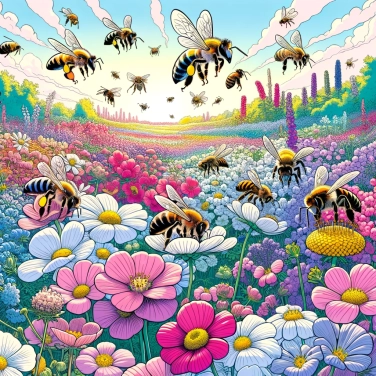Bees are crucial for pollination of plants because they feed on flower nectar and by transporting pollen from one flower to another, they enable the reproduction of flowering plants, ensuring the production of fruits and seeds.

When they go to gather nectar from flowers, bees are primarily looking for nectar and pollen. While rummaging through the flowers, they collect pollen on their hairy bodies. When they move from one flower to another, they inadvertently carry this pollen, helping to fertilize the plants. This transfer of pollen is called cross-pollination, and it is precisely what allows plants to produce seeds and fruits. Bees do more than just the work of insects: they are champions of a vital transport for the reproduction of flowers. Without bees, many plants would struggle to reproduce properly.
Bees directly influence plant richness by stimulating the reproduction of a wide variety of wild plants through their pollination work. Without bees, some plants would really struggle to reproduce and would ultimately disappear, significantly reducing ecosystem diversity. By promoting this diversity, bees ensure the maintenance of varied and balanced landscapes where many animal and plant species coexist. Fewer bees would mean fewer flowers in our fields, forests, and gardens, leading to cascading consequences for all living things. Thanks to these little workers, thousands of different plants thrive and continuously renew themselves.
Without bees, about one third of the food we eat daily would disappear. Apples, avocados, almonds, tomatoes: all these crops directly depend on the work of bees. Their activity dramatically increases the productivity of fields and allows for larger and higher quality harvests (bigger, uniform, appealing fruits). Fewer bees means less food to eat, but also a much less varied, balanced, and especially more expensive diet for everyone. To put it simply, preserving these little workers ensures an abundant, accessible, and diverse food supply on our plates.
With fewer and fewer bees, the entire pollination of plants takes a serious hit, which directly threatens plant diversity. Less pollination means fewer flowers, fruits, and varied vegetables. In the long run, this jeopardizes food security. Crop yields often depend on bees, so without them, producing enough food quickly becomes a puzzle. The decline of bees also impacts the balance of ecosystems, as many animal species directly depend on these pollinated plants to survive. A true domino effect in nature.
About 75% of global food crops depend, at least in part, on bees and other pollinating insects.
The honey produced by bees has exceptional antibacterial properties, making it an excellent natural remedy for minor wounds and sore throats.
Bees communicate through a complex dance called the 'waggle dance' to indicate to their peers the direction and distance of the nearest food sources.
There are about 20,000 different species of bees in the world, and only a small portion produces honey; however, all play a crucial role in pollination.
Although some artificial methods exist (such as manual pollination or the use of drones), none are as effective, economical, or ecological as pollination carried out naturally by bees. The latter provide extensive and free pollination, which is essential for plant biodiversity and global agricultural production.
Honey serves as the food reserve for bees during the winter. However, a measured harvest generally does not affect their health if beekeepers leave enough reserves to ensure the survival of the colony. In contrast, an unmeasured or overly intensive harvest harms the colony, potentially leading to a significant decrease in the bees' resilience.
Several factors explain this concerning phenomenon, including the massive use of pesticides, the destruction and fragmentation of natural habitats, environmental pollution, and diseases or parasites like varroa. These elements significantly weaken bee colonies, leading to their overall decline.
Each individual can help protect bees by creating favorable spaces in gardens or on balconies, planting nectar-rich flowers without pesticides, creating insect shelters, avoiding pesticides, and supporting local sustainable beekeeping.
No, not all bees play the same role in the pollination process. Worker bees have the major role, regularly visiting flowers to collect nectar and pollen, inadvertently transporting pollen grains from one flower to another and thus allowing for their fertilization. Queens mainly stay in the hive to lay eggs, and males have the sole purpose of mating with a queen.

0% of respondents passed this quiz completely!
Question 1/5